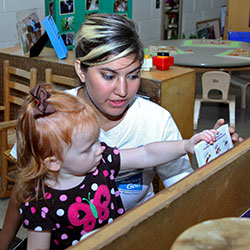Child Studies & Education
If you enjoy being around children and desire to give them a strong foundation for their lives, a career working with children could be the perfect fit for you.
Young children need a secure and nurturing environment if they are to grow into healthy, productive adults. As teachers, caregivers, mentors and role models, the individuals who care for our youngest generation leave a lasting impression.
Training Options

McLennan's Child Studies & Education department provides a great start for entering this rewarding career field. You'll learn the principles of child development, guidance, teaching and curriculum planning while emphasizing the importance of a safe and healthy learning environment. MCC offers several training options:
- You can choose from multiple certificates or an Associate of Applied Science Degree in Child Development to become an early childhood caregiver. Get ample hands-on experience at our on-campus child care center, The Child Development Center. The Child Development Center also offers care for children of McLennan students, faculty, staff and the community from 7:15 a.m.-5:15 p.m.
- Or choose the Associate of Arts in Teaching and transfer to one of our University Center partner colleges or another four-year school to complete your bachelor’s degree. You can obtain your Bachelor Degree in Teaching locally from the University Center right here on MCC campus!.
Career Outlook
As a child development professional, employment settings can range from child care centers, Head Start centers or preschools to recreational camps and hospital pediatric units. Employment opportunities in non-traditional careers are also available, such as designing or marketing children’s products or selling educational supplies.
For those who plan to pursue a teaching degree, employment can be in elementary, middle and high schools, depending on the certification you receive with your bachelor's degree.
For More Information
Please contact Dr. Daelynn Copeland, Program Director/Associate Professor, 254-299-8786 or dcopeland@mclennan.edu.
For students in this program who may have a criminal background, please be advised that the background could keep you from being licensed by the State of Texas. If you have a question about your background and licensure, please speak with your faculty member or program director. You also have the right to request a criminal history evaluation letter from the applicable licensing agency.

